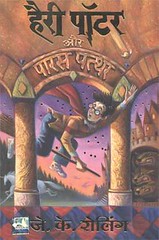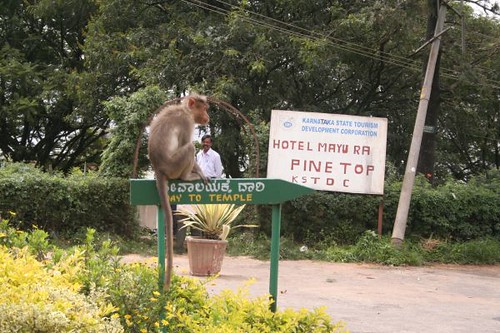hints, allegations and things left unsaid...
Mimosa pudica
When I was a child, Ma often used to tell me about the touch-me-not plants. She had come across them decades ago when grandpa had been posted in Siligudi. Even as a child with an impressionable mind, I would often look at her in disbelief. I grew up in Delhi and as long as I was there, Ma was unable to produce a specimen of the touch-me-not plant before me. Then I read about it in my school biology book (class six I suppose) and even then it remained one of those exotic species of plants that you merely read about in school textbooks. Mimosa pudica, 'nice', I would often think.
I saw the touch-me-not plant for the first time barely three years ago on a trek near Bangalore. The discovery was accidental. On touching one, I don't know who suffered a greater visible change - me or the Mimosa?
Of course now, I am much better acquainted with the plant. I see it often - usually as a weed that has taken roots amidst other prettier flowering plants. Though Mimosa is a bit of a beauty itself - it bears bright pink globular flowers:

I saw the touch-me-not plant for the first time barely three years ago on a trek near Bangalore. The discovery was accidental. On touching one, I don't know who suffered a greater visible change - me or the Mimosa?
Of course now, I am much better acquainted with the plant. I see it often - usually as a weed that has taken roots amidst other prettier flowering plants. Though Mimosa is a bit of a beauty itself - it bears bright pink globular flowers:

Harry Potter in Hindi!
 I was pleasantly surprised when I recently came across a translation of the first Harry Potter Book (Harry Potter and The Philosopher’s Stone) in Hindi (हैरी पॉटर और पारस पत्थर). Surprised because I was standing at a posh bookstore here in Bangalore, where the abundance of Hindi books at the shelf dedicated to the language, is usually marginally more than sum total of life destroying meteor collisions Earth has witnessed till date. Given my interest in languages in general and in Indian languages in particular, I picked it up.
I was pleasantly surprised when I recently came across a translation of the first Harry Potter Book (Harry Potter and The Philosopher’s Stone) in Hindi (हैरी पॉटर और पारस पत्थर). Surprised because I was standing at a posh bookstore here in Bangalore, where the abundance of Hindi books at the shelf dedicated to the language, is usually marginally more than sum total of life destroying meteor collisions Earth has witnessed till date. Given my interest in languages in general and in Indian languages in particular, I picked it up. The translation at first seemed thorough. The Times Literary Supplement quote found on the back-cover of the English version had been translated:
“The Harry Potter stories will join that small group of children’s books which are read and re-read into adulthood.”
“हैरी पॉटर की कहानियाँ चुनिंदा बाल साहित्य का हिस्सा बन गई हैं, जिने बचपन से लेकर बुढ़ापे तक बार-बार मज़े लेकर पढ़ा जा सकता है।”
Rowling’s dedication had been translated:
for Jessica, who loves stories,
for Anne, who loved them too,
and for Di, who heard this one first.
जेसिका को, जिसे कहानियाँ पसंद हैं,
एन को, जिसे भी कहानियाँ पसंद हैं,
और डी को, जिसने यह सबसे पहले सुनी।
My expectations from the Hindi translation therefore, were high. I am probably 1% of those readers who are reading the book for pure academic reasons and by no means represent the intended audience. The Hindi Translation, if it is being attempted for sound financial gains through staggering sales - which no doubt it is – needs to go beyond just literal translation of words from one language into the other. And this is precisely where it flounders.
Names of characters in the English version have an etymology which tells a lot about the general disposition of the character. Some name-character correlations might be more obvious than others, but in general they hold true. Take for instance Malfoy - the Mal here tells us a thing or two about Malfoy (the foy could be coming from foe but I am guessing here) even before the authoress attempts a character sketch. Hermione could be an allusion to the Greek god of cunning and invention, Hermes, which again is in line with what we discover about Hermione. Snape somehow feels like a play on Snake. And yes, the most obvious ones of them all – a person named Sprout could only be teaching Herbology just like a ghost named Peeves shouldn’t be expected to demonstrate congenial conduct.
Consider names an aid to character sketching. (Shakespeare does this often too – I am reminded of Andrew Agueface (from Twelfth Night), Agueface gives enough clues about Andrew being a craven!)
Now when you transliterate (or translate too literally) these names verbatim in Hindi, you lose this very aid. Worse, a lot of these names would appear tongue twisters to the intended, predominantly Hindi speaking, audience. Initially even I had trouble reading some names in their devnagri avatars; मैक्गॉनेगल for instance.
Harry Potter, despite the universality of its good versus evil theme, is set in a culture, a lot of whose aspects would appear alien to quite a few Indians. As far as I can tell, I don’t remember celebrating Halloween as a child. The title of chapter ten in the book – Halloween – wouldn’t have carried much meaning for me and I doubt if it would for children in Hindi speaking belt of Rajasthan, Haryana, UP, MP and Bihar. I don’t know if Halloween has an exact equivalent in India but Dushera might have come close. Many more such examples come to my mind where the translation has been a mere literal one, at times so literal that it is laughable:
Pg. 113 (UK edition): Ron had a piece of steak-and-kidney pie halfway to his mouth, but he’d forgotten all about it.
Pg. 142 (Hindi translation): रॉन के हाथ में स्टीक-और-किडनी भरी कचौङी का टुकङा था, जिसे वह मुँह की तरफ़ आधी दूरी तक तो ले गया था, परंतु वह उसके बारे में भूल चुका था।
(दीपक: भई आपने कभी भारत में स्टीक-और-किडनी भरी कचौङी खाई हो तो मुझे अवश्य सूचित करें)
A little work on making the book relevant to the Indian cultural context would have gone a long way in making the book more accessible to its intended audience.
That said, this one takes the cake:
Pg. 194 (UK edition): So I told him, Fluffy’s a piece o’ cake if yeh know how to calm him down
Pg. 244 (Hindi Translation): इसलिये हमने उसे बताया, फ़्लफ़ी केक का टुकङा है, बशर्ते आप उसे शांत करने का तरीक़ा जानते हों।
There are a few disjoint, weak attempts to throw in some cultural relevance. The names of the four Hogwarts houses have been translated/substituted to what might be more palatable to the Hindi readers. So Gryffindor becomes गरुङद्वार, Hufflepuff becomes मेहनतकश, Ravelclaw becomes चीलघात while Slytherin becomes नागशक्ति (Pop quiz: was Salazar Slytherin our very own नागराज?). Attempts like these are very inconsistent which makes them a little annoying – for instance, while Quidditch stays क्विडिच, Chasers become धावक, Quaffle becomes तूफ़ान, Keeper becomes रक्षक, Bludgers become पहलवान (LOL), Seeker becomes खोजी and Snitch becomes सुनहरी गेंद. The Mirror of Erised (etymology: desire written backwards) also became शहिवाख़् (which is basically ख़्वाहिश written backwards and thus honors authoress’ original intentions even if it is awkward to end a word in devnagri with “half” a ख).
I wouldn’t cast aspersions on the translator’s abilities here. I do however suspect that it was Warner Bros. or Rowling herself who in their/her zeal to retain the original essence of the book did not allow the translator any room to “localize”.
As a reader who has read the original English title, I found it enjoyable despite these shortcomings. I suspect though, that the same might not hold true for the target readership. Still, if I spot book two in Hindi (रहस्यमयी तहख़ाना - which came out recently), there is a good chance that I'll pick it up!
An honest confession here – this is the first time since Class X (close to 15 years!) that I was reading a Hindi book back to back. Something I hope I can do more of.
Monkey Business
| Archives | Blogroll |
|
May 2003 | June 2003 | July 2003 | August 2003 | September 2003 | October 2003 | November 2003 | December 2003 | January 2004 | February 2004 | March 2004 | April 2004 | May 2004 | June 2004 | July 2004 | August 2004 | September 2004 | October 2004 | November 2004 | December 2004 | January 2005 | February 2005 | March 2005 | April 2005 | May 2005 | June 2005 | July 2005 | August 2005 | September 2005 | October 2005 | November 2005 | December 2005 | January 2006 | February 2006 | March 2006 | Current Posts |
All material posted on this blog is copyrighted and may not be used in any form without the explicit permission of the author.


